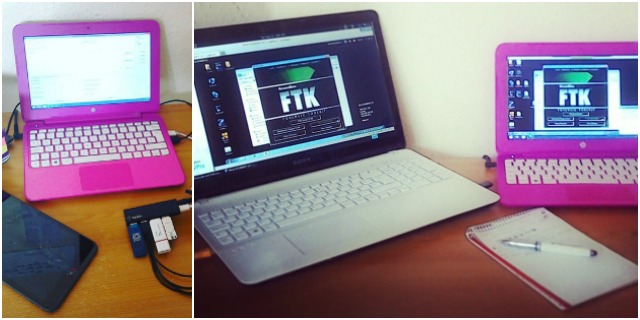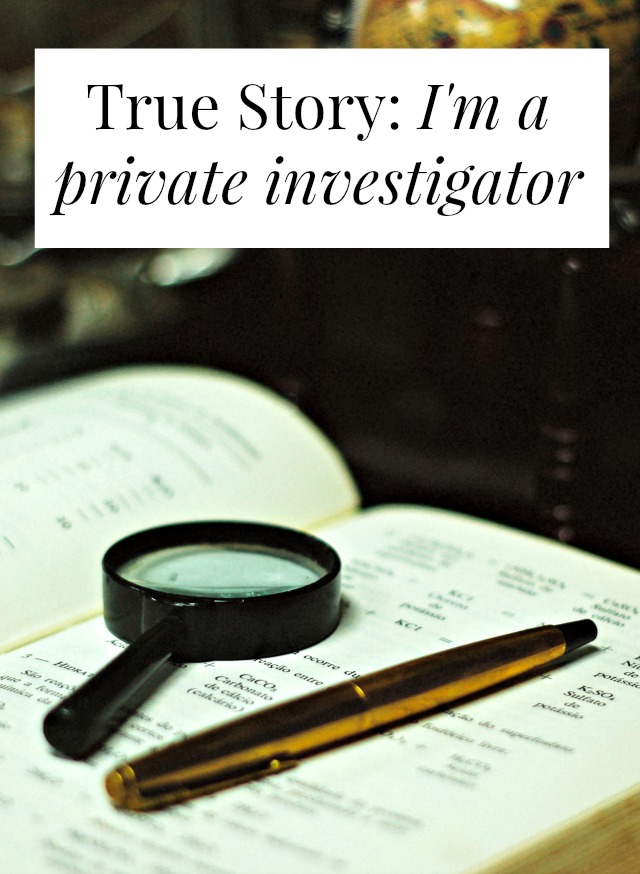Does what we see on TV bear any resemblance to real life as a private investigator? Are you really tapping phones and going on stakeouts? Today, a working P.I. tells us about her strangest cases, how she finds missing people, and how long cases usually take (you’ll be surprised!)
Tell us a bit about yourself!
I’m Scar, I live in London and I’m a private investigator specialising in computer crime. Most of my cases involve finding missing persons or child protection investigations. I work for myself, from home, although I travel a lot as well. Hobbies-wise, I read a lot, blog prolifically, sing soprano in my local choir, write and perform punk-folk songs, and I’m currently renovating my flat.
For those of us who don’t know, what does a private investigator do?
A private investigator is hired to solve human puzzles. These can be almost anything, from whether someone’s partner is cheating to why a company’s books aren’t matching up.
How did you get interested in this line of work?
I’ve been an avid lover of mystery novels since I read the Famous Five books when I was a kid. It hadn’t occurred to me that it might be a realistic career choice until about six years ago, when I had to help out with an investigation at my old job and discovered how much I loved it.
What sort of training does one have to go through to become a PI?
In the UK, there’s no specific training you have to go through, as PIs aren’t yet licensed here. This is (thankfully!) about to change, with the government and the Security Industry Agency putting together guidelines.
However, the fact that it’s not required doesn’t mean it’s a good idea to skip training altogether. There are various institutions that offer qualifications in private investigation, which can often be studied via distance learning.
If you decide to specialise, it’s also a good idea to gain further training in your desired area. I have several qualifications in digital forensics and in child protection, which are my specialties.
When do people come to you?
There are a couple of ways cases land on my desk.
Members of the public bring cases that are civil rather than criminal – i.e. cases that wouldn’t be taken to court, like partners cheating, or family members they’ve lost touch with. Sometimes the cases they bring to me could be tried in a court, but they’d rather not go down that route.
Sometimes I’ll work on a collaborative project, either with law enforcement or with corporations. In 2014, for example, I joined a project that uses technological and investigative solutions to protect children from exploitation online.
 what it looks like when Scar extracts data from a broken tablet, some of the training Scar went through
what it looks like when Scar extracts data from a broken tablet, some of the training Scar went through
Do you ever work with the police or any other branches of law enforcement?
Generally, I work alone. However from time to time my work overlaps with law enforcement, usually on the research side rather than investigation itself, though.
I find it really enjoyable to work on collaborative projects, partly because it’s a nice break from working on my own!
PIs have been prominently featured in pop culture for aaaaages. How does your day-to-day compare to what we see on tv and in movies?
I hate to disappoint you, but it really doesn’t.
Well, perhaps that’s not entirely fair. There is some overlap, but the only thing you get to see in pop culture is the really exciting bit, which makes up a small percentage of an investigator’s day.
As a digital forensic investigator, I *wish* the gadgets they use on TV shows actually existed! Most things that take 45 minutes to solve on a crime show will take months – sometimes longer – in real life. And on TV you don’t get to see the bit after they’ve caught the bad guy, where the investigator is doing due diligence on her reports, and filling in piles of paperwork, and doing her accounts…
Do the people in your life know what you do?
Yes, mostly. When I first introduce myself to people I don’t tell them what I do, because I’d rather get to know them first. But my friends all know about my job.
How many cases are you usually working on at a given moment?
Like any freelance job, private investigation has its ups and downs. Sometimes I’ll have so many cases that I’ll be working really long days; other times I’ll go for a couple of weeks without any, in which case I’ll use the time to catch up on admin or work on one of my other income streams.
Most of the cases that come my way are solved within a week. They’re generally quite straightforward and often just involve doing a bit of digging, compiling a dossier of evidence, and delivering it back to the client. However, there are some that take longer. Normally I’ll be working on about three smaller cases alongside one or two larger ones in any given week.
How do clients find you? And have you ever turned down or referred out any cases?
Clients usually find me through my site, or through ads. It’s not really the kind of job where you get many client referrals, due to the nature of the work!
I do turn down certain cases. When people approach me about finding a missing person, I’m very cautious about which ones I agree to take on. Some people are hiding for very good reasons, so there are a lot of cases in that category that I turn away. In general, I’ll only investigate a missing persons case if it’s for something like tracking down a long-lost family member’s children for a will. And even in those cases, I have a clause in all contracts that states that if I find the person and they are unwilling to release their contact details to my client, I will respect that decision.
Have you ever felt like your life was in danger?
There are parts of my job that are dangerous, sure. Some of the people I’ve investigated have been very unsavoury characters.
I think it’s important when you start any job to be aware of the dangers and difficulties surrounding it. I did training in lone worker safety, dangerous fieldwork and personal combat, all of which make me feel a bit safer. But it is important to stay on your toes in this job, definitely!
How much of your work is computer-based and how much of it is ‘in person’?
The vast majority is computer-based, because that’s what I specialise in. If I do any ‘in-person’ work, it’ll usually just be a quick trip to verify findings. I much prefer working from behind a computer screen, mainly because it means I have nice, short commute to my home office!
Let’s say you’re working on a missing persons case. How do you go about finding someone?
It depends a lot on the case, and often also on the age of the missing person. For younger people, a lot of information can be gleaned online, using open source techniques such as social media analysis. Even if they stopped using their profiles after they went missing, and even if they have secret profiles that aren’t set up with their real names, it’s often possible to find quite a lot of useful information.
For older people – for example, families who haven’t talked to Great Aunt Ethel for forty years and want to know if she’s alive – you usually have to rely on a mixture of online and offline methods. Public records, interviewing old neighbours, and so on.
The more information your client can give you to start with, the more leads you have to follow, which makes the case much more likely to be solved!
Can you tell us – even in vague terms – about some of the most interesting cases that you’ve worked on?
The most bizarre one happened during my first year as an investigator. A man called me and said someone was sending his wife obscene messages, and he wanted me to find out who it was. He said he suspected a friend of hers.
Long story short, it turned out that the man himself – my client! – was the one sending the messages, in a bid to turn his wife against her friend. How in the world he expected I wouldn’t work this out I have no idea. It was like something out of a soap opera!
In your opinion, what character traits make for a good PI?
Excellent attention to detail and a high tolerance for boredom. PIs who specialise in offline investigation will spend a lot of time on surveillance missions, which are mind-numbingly dull. Online investigators will spend hours wading through swathes of evidence to try to find that one single thing that doesn’t match up.
Balls of steel help, too. 😉
What are a few things you’ve learned that ANY of us could apply to our daily lives?
The vast majority of bad things that happen to you will be committed by someone you know and trust. This is the kind of thing no one wants to hear, but it’s true. Obviously, you need a certain level of trust in order to have normal relationships, but especially in cases of child protection, don’t assume that the person who might harm your child is a stranger lurking in the shadows. It’s much more likely to be their Uncle Fred.
Facinating stuff, right? Do you guys have any questions for Scar?
P.S. More interviews about interesting jobs: a stripper, a long haul trucker, and a fashion illustrator!













One of my college friends became a private investigator. She complained about the boredom too, the pay and lack of benefits. She also pointed out not being able to use the restroom while on surveillance. A large portion of her work was stalking workman comp patients to see if they were scamming the system.
On a side note, I recently heard on the radio Dec 26th was the busiest day for your profession because most cheating spouses spend this day with their girlfriends.
I think the boredom is something that needs to be taken into consideration, definitely. I love my job but there are times when it’s tedious (although that’s the case with many things, to be fair!). Surveillance is probably the most long-winded part of private investigation; I don’t do much of that due to the nature of my work, but I completely understand why your friend complained about it being boring!
Thanks for your comment 🙂
So interesting – thanks for sharing! I adore a good mystery – this sounds like such a fascinating profession!
Thanks, glad you liked it! 🙂
This was so interesting, thank you so much Sarah and Scar! I love the fictional Private Investigator Kinsey Millhone (from the books by Sue Grafton), so reading an interview with a current-day PI who has a pretty similar experience is so cool!
JessB, your comment made me so happy! Kinsey Millhone was one of my main inspirations and a big reason why I became a PI. I knew my life wouldn’t be exactly like hers is in the books, but I love the series and I always wanted to be at least a *little* bit like her. Kinsey rocks! 🙂
Love the “balls of steel” part! I work for a PI firm and yes it can sometimes be a little boring. I remember I had to do surveillance on a infidelity case and the spouse literally drove 2 hours to another city…on a Wednesday. Glad i was able to read this. It really hits the spot when it comes to what we PI actually do.